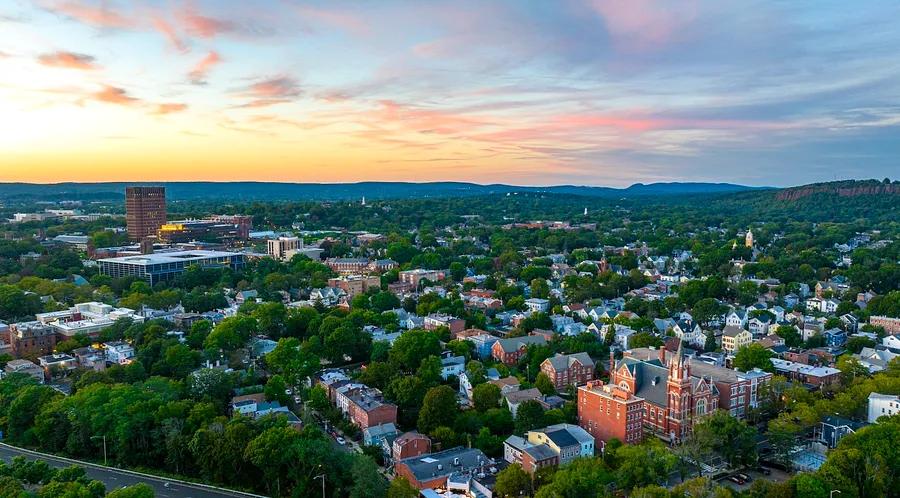The Top New Hotels of the World: 2022 Edition

As recent years have shown, sustainability is crucial for both the planet and its inhabitants. It’s equally essential for the future of travel: The 14 new and refurbished properties on our 2022 Stay List focus on community, social responsibility, and eco-conscious practices. These properties are redefining hospitality by benefiting both travelers and locals. Discover the innovative hotels reshaping our travel experience.

Photo by Daniela Zondagh
Sterrekopje
Franschhoek, South Africa
After an extensive global search for a regenerative farm, Dutch entrepreneurs Fleur Huijskens and Nicole Boekhoorn chose the Western Cape wine region in South Africa. Just under five miles from Franschhoek, Sterrekopje rests on 124 acres, home to 17th-century farm buildings. The couple has created an 11-room retreat focused on sustainability, from its gray water system to a zero-waste restaurant. The on-site chefs use fresh, seasonal ingredients, including eggs from the property. The essence of this sanctuary is to disconnect from the busyness of life and reconnect with nature, offering stays ranging from three to seven days. Guests can choose their path to peace, whether through a Reiki session in the spa or pottery lessons in the arts studio. Each guest room is uniquely designed with cool tile floors, wooden four-poster beds from Lamu, Kenya, exposed beams, and some rooms feature fireplaces, soaking tubs, and outdoor showers.

Courtesy of Six Senses Shaharut
Six Senses Shaharut
Negev Desert, Israel
Located in the southern Negev Desert of Israel, Six Senses Shaharut collaborates with local communities to offer visits to a traditional kibbutz, where guests can learn about permaculture and organic farming practices. Visitors can also embark on a guided tour that follows a portion of the ancient 1,200-mile incense route, delving into the history of regional trade. The 60 LEED-certified guest rooms are built entirely on-site, with materials like reclaimed wood and limestone sustainably sourced from the settlement grounds, leaving the unique desert landscape untouched.

Photo by Reuben Nutt & Courtesy of Silky Oaks Lodge
Silky Oaks Lodge
Mossman, Queensland, Australia
The ancient Daintree Rainforest, over 180 million years old, has been the ancestral home of the Eastern Kuku Yalanji people for more than 50,000 years. This lush habitat is teeming with colorful buff-breasted paradise kingfishers, musky rat-kangaroos, and glowing bioluminescent fungi. Nestled on 80 acres of forest next to the rainforest in northeastern Queensland, the newly revitalized Silky Oaks Lodge offers an eco-conscious sanctuary for those looking to immerse themselves in the world’s oldest rainforest and explore its rich indigenous heritage. The 40 guest rooms feature treehouse suites, each with its own outdoor stone bath. For those wishing to learn about medicinal plants or catch a glimpse of the vivid blue Ulysses butterfly, Aboriginal-owned Walkabout Cultural Adventures offers guided tours, sharing centuries-old wisdom of the rainforest.

Photo by Jaquil Imagery
Golden Rock Resort
St. Eustatius, Caribbean
St. Eustatius, a serene island with volcanic sand beaches, remains a hidden gem for most travelers. Located just a 20-minute flight from the more well-known St. Maarten, this tranquil Caribbean destination is now gaining attention with the opening of Golden Rock Resort. Situated on 40 acres with panoramic sea views, Golden Rock is the first luxury resort on the island, fully powered by solar energy. Fresh drinking water is produced through reverse osmosis, and a sophisticated gray water system, utilizing reeds and bamboo, irrigates the resort's lush grounds. The 32 guest rooms, each with a private balcony and wooden floors, offer a comfortable retreat for those exploring the island’s 12-square-mile expanse. Guests can select from over two dozen hiking trails, including paths leading to the acacia-covered Boven National Park and the dormant Quill volcano. St. Eustatius, affectionately known as Statia, is also renowned for its world-class diving, protected by the St. Eustatius National Marine Park. Here, visitors can explore coral-encrusted shipwrecks and swim alongside manta rays and sea turtles.

Courtesy of Gros Morne Inn
Gros Morne Inn
Shoal Brook, Newfoundland, Canada
Until recently, there were few notable accommodations near Gros Morne National Park in Newfoundland. That changed with the launch of Gros Morne Inn, where owners Ian Stone and Rebecca Brushett ensure that visitors can explore the park’s rugged coastlines, dense forests, and breathtaking fjords while minimizing their environmental impact. The 15-room inn is designed with sustainability in mind, from repurposed materials to eliminating single-use plastics and utilizing renewable hydroelectric power. For the carbon footprint that can’t be offset through these operations, the inn donates to a local nonprofit. Additionally, the inn aims to achieve certification from Ocean Wise for serving only sustainably sourced seafood at its restaurant.

Courtesy of One Hotel Toronto
1 Hotel Toronto
Toronto, Ontario, Canada
In the past seven years, 1 Hotels has shown that eco-conscious luxury can thrive in major North American cities, from New York to West Hollywood. The 1 Hotel Toronto, located in the heart of the city, is no exception. Collaborating with architecture and design firm Rockwell Group and developer Athens Group, this marks 1 Hotel's first Canadian location. Toronto-based artisans crafted custom dining and side tables from local wood for the 112 biophilic guest rooms and common areas, which are filled with native plants on every surface. The hotel also partners with Green Planet, a recycling organization, to turn used kitchen oil and grease into biofuel.

Photo by Jason Varney
Guild House Hotel
Philadelphia, Pennsylvania
Repurposing historic buildings into luxurious hotels is a growing trend, and the Guild House Hotel in Philadelphia is a prime example. This stunning restoration of a National Historic Landmark tells a compelling story. Once the home of the New Century Guild, a group of influential women who were abolitionists, suffragists, and artists in the 1800s, the Victorian building now houses a boutique hotel. First-time hotelier Brennan Tomasetti collaborated with the female-led interior design firm Rohe Creative to transform the space, which now features 12 rooms adorned with custom-designed wallpaper and carefully selected antiques. Each room honors a different member of the guild, including Eliza Sproat Turner, the founder, whose love of nature is reflected in the botanical prints that decorate her former library-turned-bedroom.

Courtesy Room2 Chiswick
Room2 Chiswick
West London, England
Room2 Chiswick, part of a rapidly expanding brand in Europe with a commitment to net-zero carbon emissions, strives to make sustainable hospitality affordable for all. This 86-room hotel in West London is designed to use 89% less energy than the typical U.K. hotel, with rates starting well under $200 per night. Reclaimed terracotta tiles enhance the lobby, while carpets in the hallways are crafted from recycled fishing nets. Collaborating with the Forest Stewardship Council, the hotel sources sustainable wood for its furniture, and offsets the carbon produced during manufacturing by planting 4,400 trees in Nicaragua. Powered by solar panels and heat pumps, the hotel also features a “blue roof” that collects over 13,000 gallons of water to help prevent local flooding.

Courtesy of Explora El Chaltén
Explora El Chaltén
Patagonia, Argentina
Since 1993, Explora has been offering immersive conservation experiences throughout South America. Now, the group is bringing its ethos to a secluded region of Argentine Patagonia, near the iconic Mount Fitz Roy trekking area. Explora El Chaltén has been established in the exclusive 14,000-acre Los Huemules Reserve, an area rich with native ñirre and lenga trees. The lodge’s primarily female team of guides leads rock climbing and glacier hiking expeditions, where they help guests spot incredible birds of prey such as Andean condors and white-throated caracaras. The lodge's 20 guest rooms, built in Mendoza using prefabricated modular units, are designed to minimize environmental impact and blend seamlessly with the landscape. Raised on timber stilts, the rooms further reduce their ecological footprint.

Photo by Fabian Martinez courtesy of Grupo Habita
Hotel Terrestre
Oaxaca, Mexico
Perched in the Oaxacan hills with sweeping views of the Pacific Ocean, Hotel Terrestre blends contemporary design with eco-conscious principles. Mexican hospitality group Grupo Habita enlisted renowned Mexico City architect Alberto Kalach, famous for his environmentally sustainable designs that integrate seamlessly with the landscape, to create this stunning property. (Kalach is also behind the Casona Sforza retreat in Puerto Escondido.) The hotel’s 14 villas, constructed from local clay, wood, brick, and concrete, are thoughtfully designed to harmonize with the surrounding sandy terrain. Each villa features a private terrace with an outdoor shower, dipping pool, and hammock, while custom furnishings by Oscar Hagerman were crafted by local artisans. Entirely solar-powered, the hotel is naturally cooled through strategic cross-ventilation and fans. The landscaping incorporates native plants like copales and mesquites, which thrive in the dry climate.

Photo by Tomohiro Sakashita
Azumi Setoda
Ikuchijima, Seto Inland Sea, Japan
The newly opened Azumi Setoda welcomes visitors to a lesser-known corner of Japan, a hidden gem even for many locals. Situated in the Seto Inland Sea, the tranquil island of Ikuchijima has a population of just 10,000. There, renowned Kyoto-based architect Shiro Miura was given the task of transforming a 146-year-old private residence into 22 distinct guest rooms. The accommodations offer a modern interpretation of the traditional ryokan, complete with rice paper screens, cypress wood bathtubs, and private gardens overlooking a peaceful courtyard. Meals feature seasonal local ingredients, such as octopus and Omishima wild boar, all served on antique plates that once belonged to the estate’s original owners. In line with its sustainability efforts, Azumi is committed to using only renewable energy sources by 2023.

Courtesy Wilderness SDinogois
Wilderness SDinogois Vumbura Plains
Lechomos, Botswana
The Wilderness SDinogois lodge company has been dedicated to sustainable practices since its founding in 1983. In 2022, its Vumbura Plains camp in Botswana was fully renovated, featuring 14 newly designed guest suites by the interior design firm Reflecting Africa, headed by Cate Simpson. Working with local artisans, they crafted high-vaulted thatched roofs, natural wood flooring, and handwoven textiles to create an eco-conscious yet luxurious retreat. After experiencing the wildlife of the Okavango Delta, a UNESCO World Heritage site, guests can unwind in this stylish haven. The camp leases land from five neighboring villages and provides employment for 150 local workers. The lodge’s collaboration with the Okavango Community Trust, formed in 1996, focuses on supporting the villages with sustainable farming practices and COVID-19 relief programs.

Photo by Elsa Young
Kisawa Sanctuary
Benguerra Island, Mozambique
Ocean conservation often lags behind land-based initiatives, making it refreshing to see a tourism project that prioritizes marine research and preservation. Located on over 700 acres of pristine beach and coastal forest on Benguerra Island off the central coast of Mozambique, Kisawa Sanctuary features 21 bungalows crafted from local timber and advanced 3D printing technology. This cutting-edge approach also extends to the construction of artificial coral, aiding in the restoration of nearby reefs. The sanctuary collaborates with the Bazaruto Center for Scientific Studies, a solar-powered nonprofit focused on marine conservation. Its research supports global scientific endeavors while enhancing guests' experiences, who have the opportunity to assist in shark tagging or explore vibrant underwater landscapes alongside scientists and documentary filmmakers.

Courtesy of Alila Marea Beach Resort
Alila Marea Beach Resort
Encinitas, California
A new destination for travelers has emerged in Encinitas, a coastal city just 25 miles north of San Diego. The Alila Marea Beach Resort has partnered with the sustainable-tourism organization Earth Check to achieve zero waste to landfills within the next five years. The resort employs several green practices, including eliminating single-use plastic water bottles and composting all food scraps and paper waste. Guests can charge their electric vehicles at one of four EV charging stations or borrow electric bikes to explore Cardiff-by-the-Sea, a local surf haven. The resort offers 130 guest rooms with views of the Pacific Ocean or lagoon, some featuring patio fire pits. The property's smart LED lighting system helps reduce energy consumption by 80% by automatically turning off lights in unoccupied areas.

1

2

3

4

5
Evaluation :
5/5